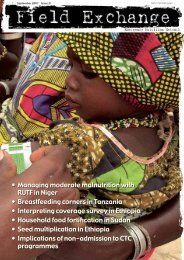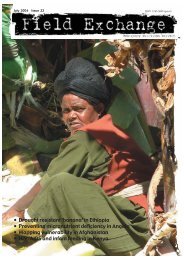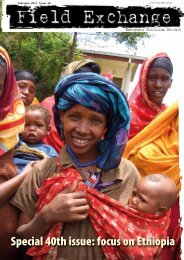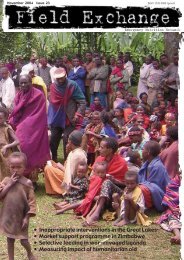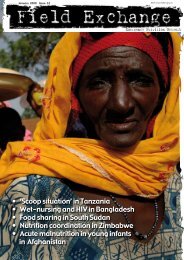Download a PDF of this issue - Field Exchange - Emergency ...
Download a PDF of this issue - Field Exchange - Emergency ...
Download a PDF of this issue - Field Exchange - Emergency ...
You also want an ePaper? Increase the reach of your titles
YUMPU automatically turns print PDFs into web optimized ePapers that Google loves.
News<br />
result, a 1-day emergency simulation exercise was developed<br />
in consultation with a range <strong>of</strong> NIE experts. The simulation<br />
was reviewed and revised following each course. <strong>Field</strong>-based<br />
exercises relating to the management <strong>of</strong> acute malnutrition<br />
and nutrition surveys were adapted from the HTP and tested<br />
during the course in Uganda.<br />
Evaluation<br />
Modules were delivered by experienced facilitators and feedback<br />
was obtained using a variety <strong>of</strong> evaluation approaches.<br />
All materials were piloted at least twice and reviewed and<br />
revised from one course to the next based on comments from<br />
course participants, our partners and course facilitators.<br />
Module-specific and end-<strong>of</strong>-course evaluation forms were<br />
administered to participants. Feedback from each partner<br />
organisation and the course facilitators was obtained verbally<br />
and via email. Follow-up <strong>of</strong> course participants was done<br />
approximately 3 months after each course ended.<br />
Assessment<br />
A multiple-choice questionnaire was developed and tested to<br />
assess the progress <strong>of</strong> participants. Each <strong>of</strong> the 40 questions<br />
was designed to correspond to one <strong>of</strong> the three levels <strong>of</strong> learning,<br />
based on a modified version <strong>of</strong> Bloom’s taxonomy<br />
(knowledge, combined comprehension and application, and<br />
problem solving) 9 . The MCQ was pilot tested before being<br />
administered to course participants. The test was given at the<br />
start and end <strong>of</strong> the course and scores were reviewed and<br />
analysed by participant and topic.<br />
Results<br />
Course uptake<br />
Overall, 131 applications were received for the three courses<br />
run during the pilot phase. The first course (held in Lebanon)<br />
was restricted to practitioners from the Middle East and only<br />
19 applications were submitted. Fifty-six applications were<br />
received for each <strong>of</strong> the two other courses (held in Uganda<br />
and Thailand).<br />
A total <strong>of</strong> 67 people attended the courses. The majority <strong>of</strong><br />
participants worked either for an international non-governmetnal<br />
organisation (INGO) (28%) or a UN agency (34%). The<br />
rest worked for government ministries (9%), academic institutions<br />
(8%), local NGOs (6%), donor organszations (6%) or<br />
were self-employed (9%). Sixty-six per cent <strong>of</strong> participants<br />
worked in nutrition, 15% in health, 9% in general emergency<br />
programme management and 8% in food security. One participant<br />
worked in logistics.<br />
One third (33%) <strong>of</strong> participants were working in Western<br />
Asia (including Middle Eastern countries), 18% in Northern<br />
Africa (predominately Sudan), 13% in Eastern Africa, 12% in<br />
Southern Asia, and 6% each in Western Africa, South-east<br />
Asia and Australia. The rest had a regional/global remit.<br />
Overall, 73% <strong>of</strong> participants were national staff (i.e. working<br />
in the country where they are from).<br />
Simulation exercise: Inter-agency<br />
coordination, Thailand course<br />
A Perry/NIETN, Uganda, 2011<br />
Table 1: Overview <strong>of</strong> the NIERTI courses run to date<br />
Location Lebanon Uganda Thailand<br />
Partner American University <strong>of</strong> Beirut University <strong>of</strong> Makerere Asian Disaster Preparedness<br />
Centre<br />
Duration 6 days 12 days 10 days<br />
Number <strong>of</strong><br />
participants<br />
Modules<br />
covered<br />
17 (+2 students) 20 28<br />
Introduction to NIE Introduction to NIE Introduction to NIE<br />
Causes <strong>of</strong> malnutrition Causes <strong>of</strong> malnutrition Causes <strong>of</strong> malnutrition<br />
Humanitarian system Humanitarian system Humanitarian system<br />
Humanitarian standards and M&E Humanitarian standards and M&E Humanitarian standards and M&E<br />
Rapid assessments Rapid assessments Rapid assessments<br />
Nutrition surveys Nutrition surveys Nutrition surveys<br />
- Surveillance and early warning Surveillance and early warning<br />
- Food security and livelihoods Food security and livelihoods<br />
Food assistance Food assistance Food assistance<br />
Micronutrient interventions Micronutrient interventions Micronutrient interventions<br />
- Advocacy Advocacy<br />
Management <strong>of</strong> severe acute<br />
malnutrition<br />
Management <strong>of</strong> moderate acute<br />
malnutrition<br />
An overview <strong>of</strong> each <strong>of</strong> the courses<br />
run during the pilot phase <strong>of</strong> the NIERTI<br />
is given in Table 1.<br />
Cost<br />
The first <strong>of</strong> the three courses (held in<br />
Lebanon) was subsidised since it was the<br />
first ‘pilot’ course. The fee was US$500<br />
for 6 days (excluding accommodation)<br />
and the cost <strong>of</strong> course facilitators was<br />
covered by the project funding. This<br />
course has not been included in the<br />
following analyses because it is not<br />
representative <strong>of</strong> the actual costs <strong>of</strong><br />
running NIE training. The next two<br />
courses had a fee <strong>of</strong> US$ 2,500 including<br />
meals and accommodation. The course<br />
in Uganda was 12 days and the Thailand<br />
course lasted 10 days. This equates to<br />
US$208 per person per day for Uganda<br />
and US$250 per person per day for<br />
Thailand. As a comparison, the 5-day<br />
course in NIE run by the University <strong>of</strong><br />
Westminster (London, UK) costs the<br />
equivalent <strong>of</strong> US$ 1,100 (based on<br />
current exchange rates), excluding<br />
accommodation and meals other than<br />
lunch. This equates to US$ 220 per day<br />
or US$ 2,640 for 12 days.<br />
Of the 48 people who attended the<br />
full-price courses in Uganda and<br />
Thailand, 83.3% were funded by their<br />
employer, 10.4% were sponsored by<br />
another organisation and 6.3% were self<br />
funded. Feedback from participants<br />
indicated that the course was viewed as<br />
good value for money. Of the 222<br />
enquires that had been received about<br />
the initiative by the end <strong>of</strong> August 2011,<br />
23 were requests for funding support.<br />
None <strong>of</strong> these individuals subsequently<br />
Management <strong>of</strong> severe acute<br />
malnutrition<br />
Management <strong>of</strong> moderate acute<br />
malnutrition<br />
Management <strong>of</strong> severe acute<br />
malnutrition<br />
Management <strong>of</strong> moderate acute<br />
malnutrition<br />
Infant feeding in emergencies Infant feeding in emergencies Infant feeding in emergencies<br />
<strong>Emergency</strong> preparedness <strong>Emergency</strong> preparedness <strong>Emergency</strong> preparedness<br />
<strong>Emergency</strong> simulation <strong>Emergency</strong> simulation <strong>Emergency</strong> simulation<br />
Pr<strong>of</strong>essional development Pr<strong>of</strong>essional development Pr<strong>of</strong>essional development<br />
- Pre-/post-test MCQ Pre-/post-test MCQ<br />
- <strong>Field</strong> training (nutrition surveys) -<br />
- <strong>Field</strong> training (management <strong>of</strong> -<br />
SAM)<br />
- <strong>Field</strong> training (management <strong>of</strong><br />
MAM)<br />
-<br />
attended a course. Sixteen people who<br />
were <strong>of</strong>fered a place on a course reported<br />
that they were unable to attend because<br />
<strong>of</strong> a lack <strong>of</strong> funding.<br />
The most expensive components <strong>of</strong><br />
the courses were the facilitators followed<br />
by accommodation/meals for participants.<br />
Expenditure on facilitators was<br />
US$ 1,227 per participant in Uganda and<br />
US$ 661 per participant in Thailand. In<br />
both cases <strong>this</strong> does not include a fee for<br />
the lead facilitator or for an additional<br />
facilitator who taught several modules,<br />
both <strong>of</strong> whom work for UCL CIHD. The<br />
cost per participant in Thailand was<br />
lower because we had more participants<br />
and were able to secure facilitators who<br />
were based locally and who were not in<br />
a position to accept a fee (which cannot<br />
always be guaranteed). Even so, the<br />
course in Thailand only just covered all<br />
costs using fees and in Uganda we<br />
incurred a loss that was buffered using<br />
project funding. The cost <strong>of</strong> accommodation,<br />
meals and the training venue was<br />
$72 per participant per day in Uganda<br />
and $110 per participant per day in<br />
Thailand.<br />
Evaluation<br />
The response to each course was positive.<br />
Overall, 56% <strong>of</strong> participants<br />
strongly agreed and 42% agreed that the<br />
course they attended met the goal to<br />
prepare them to respond to the nutritional<br />
needs <strong>of</strong> people affected by<br />
emergencies. The improvement in<br />
9<br />
Anderson LW et al. (eds.) (2001). A Taxonomy for<br />
Learning, Teaching, and Assessing: A Revision <strong>of</strong><br />
Bloom's Taxonomy <strong>of</strong> Educational Objectives. New<br />
York: Longman.<br />
51



